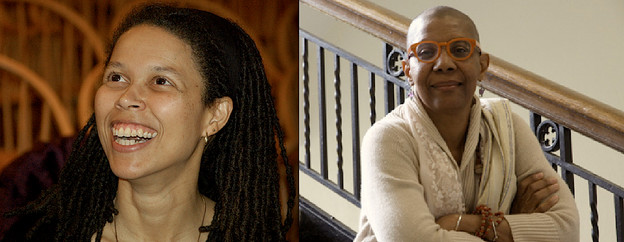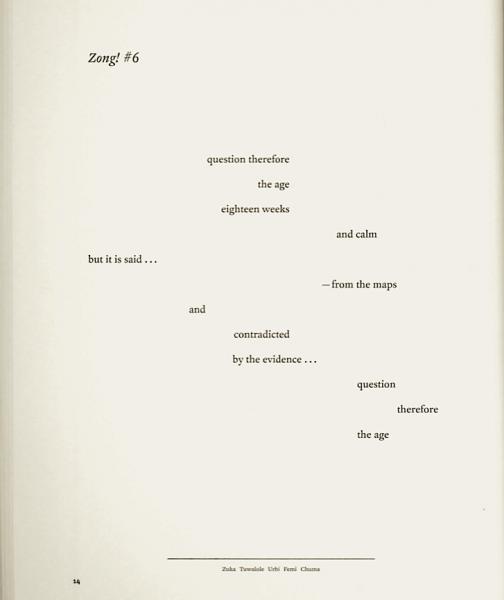
First reading of M. NourbeSe Philip's 'Zong!' #6 (1)
Evie Shockley

Evie Shockley’s first reading of NourbeSe Philip’s Zong! #6 is the first of five we will publish in this second set of short essays in the new series. We will soon add first readings of Philip by Arlene Keizer, Meta DuEwa Jones, and Kathy Lou Schultz, among others. — Brian Reed, Craig Dworkin, and Al Filreis
* * *
If I remember correctly, my first first reading of NourbeSe Philip’s Zong! was a listening. In that I was lucky, because Philip is a beautiful reader of her own work, reciting in a quiet, steady voice that makes even the harshest, most guttural sounds in the English language (“l/anguish”) sound comforting — and also because hearing parts of Zong! read aloud gives one assurance that it can be read on the page. Introduced by Tonya Foster, one of the curators of the Segue reading series at that time, Philip took the stage in the darkened performance space of the Bowery Poetry Club and led us into a particularly dark (or Enlightened?) moment of world history. Listening has often provided me a powerful entry point into works that I might otherwise have floundered around in for a while.
For works like Philip’s that have a strong conceptual or procedural component, I often also begin by reading an artist statement or interview — some authorial discussion of what is at stake and why s/he has gone about creating the poem in an unconventional and perhaps opaque fashion. Is this cheating? There are those who argue that a poem should be able to stand on its own, without paratextual accoutrements. I’d argue that a reader should say thank you politely when offered a hand getting into a complex, nuanced poem of this sort. Philip’s “Notanda,” a “making of” essay on Zong! (included in the book), is great gift. From it we learn what the Zong was (a slaveship), where it was going in 1781 (Jamaica), and why it stands out among the many, many, many slaveships and voyages involved in the transatlantic slave trade over a few hundred years (because of a calculated shipboard massacre masquerading as insurance fraud).
By the time I arrive at the page where Zong! #6 is inscribed, in other words, I’m not reading blind. I know the language of this poem was once (still is) the language of a legal decision, in which trial and appellate court justices in England were able to consider the merits of an insurance claim for the loss of property — 140 African people, deliberately thrown overboard to prevent them from dying of dehydration at their owner’s expense — without considering it, even potentially, as murder. The decision is being made to tell on itself. The story of those massacred (and those remaining enslaved) is being offered a space in which to tell itself.
I see the circularity of the language as it is laid out on the page (particularly in the book, where the phrases “and calm” and “— from the maps” are farther to the right than the version available online). Though the linear reading is the one Philip gives, we can take note of the way legal reasoning — with its supposedly logical “therefores,” its agentless “it is saids,” its firmly delimited “the evidences” and “the maps” — chases its own tail until, dizzy, exhausted, it spins us out on a would-be new trajectory (with the last three lines, the O becomes a Q) that is somehow exactly where we started (questioning, therefore, the age).
But we’re not exactly where we started. Though the phrase repeats, the lines break differently: “question therefore / the age” becomes “question / therefore / the age.” The first “therefore” hides behind, or huddles against, its “question”; it knows, if you will, that it is supposed to mark an inference based on foregoing information, but no information precedes it within this poem. In its second appearance, however, it stands solidly on its own line and on the evidence of contradictions. Similarly, the first occurrence of “the age” is undercut by the immediately following phrase: “eighteen weeks.” As a period of time, four and a half months (especially rendered in weeks) does not seem especially long. But we are told to question it: eighteen weeks of what? Eighteen weeks at sea, on board a sailing vessel, with winds that are ominously “calm.” That might indeed seem like an age. And the unqualified “age” that ends the poem feels much more expansive, feels like an era when people and documents lie about what it means to call Africans cargo and treat them as property — lie blatantly, in the face of contradictory evidence — a period, say, of a few hundred years …
And where is everybody? The I has gone missing. The other speakers are abstracted (“it is said”). The you is understood (“question / therefore”). The Africans are understated: “Zuka Tuwalole Urbi Femi Chuma.” Understated :: below deck. Underwritten :: the fine, fine print.
And that is how I do a first reading of this kind of poem. I gather up everything at hand that might be useful in a quick reconnoiter; I go into the poem with all my wits about me; and I tell myself stories about the language, listening closely for what sounds true.

Evie Shockley is the author of two books of poetry — most recently, the new black (Wesleyan) — and a critical study, Renegade Poetics: Black Aesthetics and Formal Innovation in African American Poetry (Iowa). Currently serving as creative writing editor for Feminist Studies, Shockley is an associate professor of English at Rutgers University–New Brunswick.